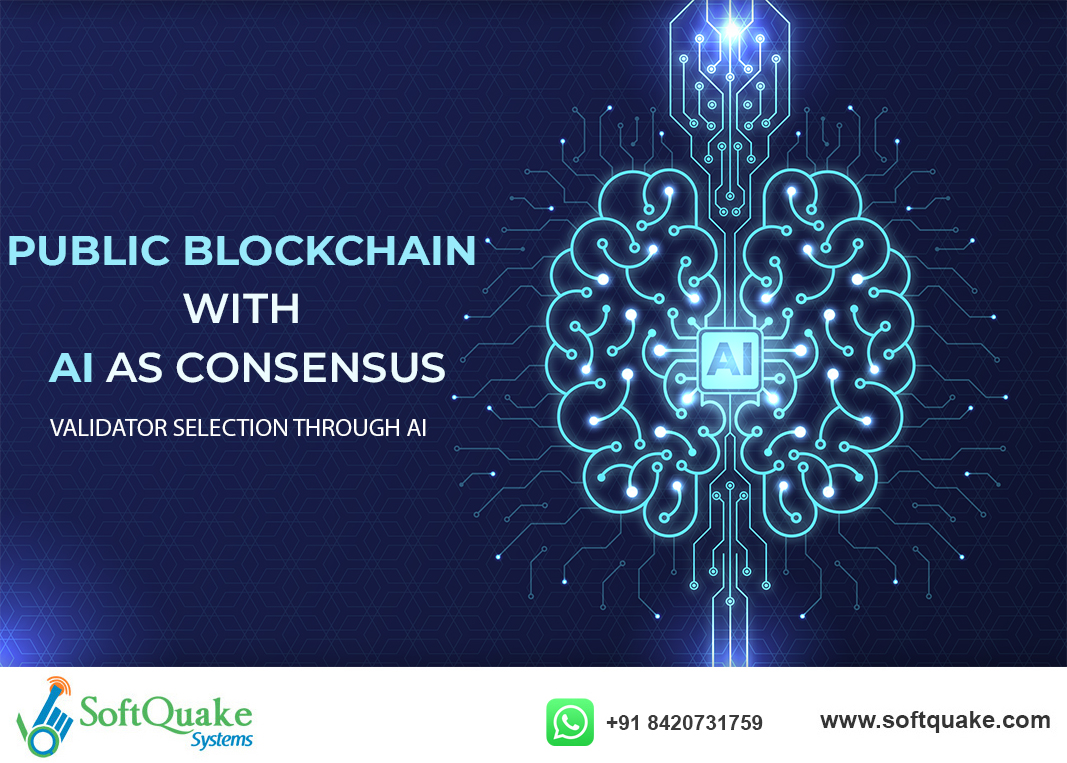Public Blockchain with AI as Consensus, Validator Selection through AI
Blockchain technology is a distributed ledger system that allows for secure, transparent, and tamper-proof transactions. It has the potential to revolutionize many industries, including finance, healthcare, and supply chain management.
One of the challenges of blockchain technology is consensus. Consensus is the process by which nodes in a blockchain network agree on the validity of transactions. In traditional blockchains, consensus is achieved through a process called mining. Miners use their computing power to solve complex mathematical problems in order to add blocks of transactions to the blockchain. This process is energy-intensive and can be slow.
Artificial intelligence (AI) can be used to solve the consensus problem in blockchain networks. AI-based consensus algorithms can be more efficient and secure than traditional mining algorithms.
One example of an AI-based consensus algorithm is Proof of Learning (PoL). PoL is a competition-based consensus algorithm that uses machine learning models to validate transactions. In PoL, nodes in the network submit machine learning models to validate transactions. The models are then ranked by a network of validators. The node with the highest-ranked model is awarded the right to add the next block of transactions to the blockchain.
PoL is a more efficient and secure consensus algorithm than traditional mining algorithms. It is more efficient because it does not require nodes to solve complex mathematical problems. It is more secure because it uses machine learning models to validate transactions.
Another example of an AI-based consensus algorithm is Proof of Stake (PoS). PoS is a consensus algorithm in which nodes in the network are chosen to validate transactions based on their stake in the network. In PoS, nodes must stake a certain amount of cryptocurrency in order to be eligible to validate transactions. The more cryptocurrency a node stakes, the more likely it is to be chosen to validate transactions.
PoS is a more efficient and secure consensus algorithm than traditional mining algorithms. It is more efficient because it does not require nodes to solve complex mathematical problems. It is more secure because it does not require nodes to use a lot of computing power.
AI-based consensus algorithms are a promising new approach to solving the consensus problem in blockchain networks. They are more efficient and secure than traditional mining algorithms. This makes them ideal for use in public blockchain networks that require high throughput and security.
Validator Selection through AI
In addition to consensus, another important aspect of blockchain networks is validator selection. Validators are the nodes in the network that are responsible for validating transactions and adding blocks to the blockchain. They play a critical role in ensuring the security and integrity of the network.
Traditionally, validators are selected based on their stake in the network. This means that the more cryptocurrency a node stakes, the more likely it is to be chosen as a validator. However, this approach can lead to centralization, as a small number of nodes with large stakes can come to control the network.
AI can be used to select validators in a more decentralized and fair way. AI-based validator selection algorithms can take into account a variety of factors, such as a node's stake, its uptime, and its reputation. This ensures that the network is secured by a diverse group of nodes that are committed to the network's success.
AI-based validator selection is a promising new approach to ensuring the security and integrity of blockchain networks. It is a more decentralized and fair way to select validators, and it can help to prevent centralization of the network.
Conclusion
AI is a powerful tool that can be used to solve the consensus and validator selection problems in blockchain networks. AI-based consensus algorithms are more efficient and secure than traditional mining algorithms. AI-based validator selection algorithms are more decentralized and fair than traditional methods.
AI is a key technology that will help to drive the adoption of blockchain technology. As AI continues to develop, we can expect to see even more innovative and efficient ways to use AI in blockchain networks.
 +91 8420731759
+91 8420731759 +91 8420731759
+91 8420731759







